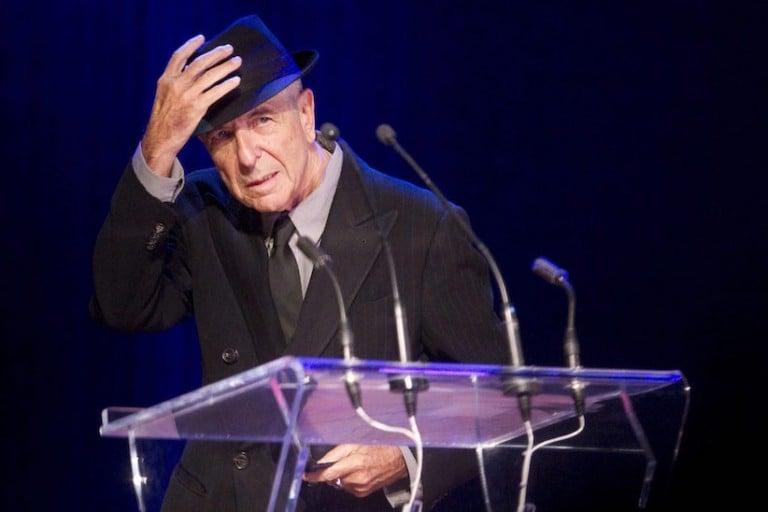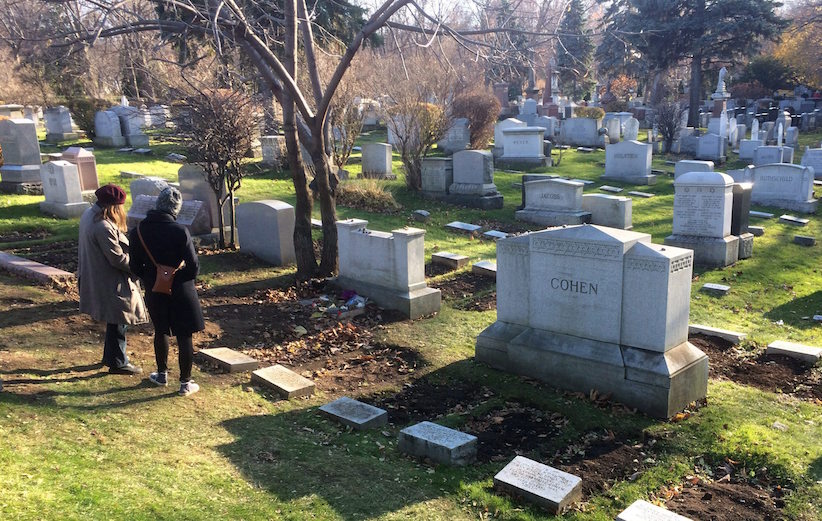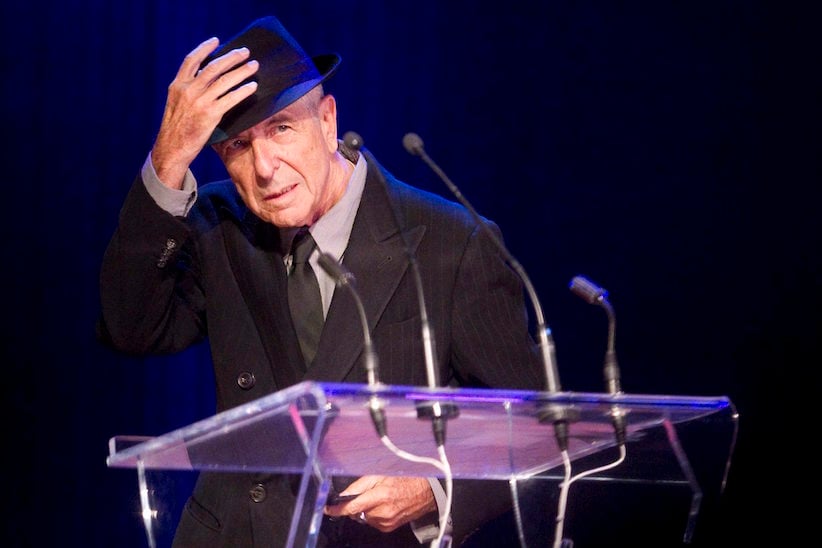Canadians share how Leonard Cohen touched our lives
Canadians shared their stories of Leonard Cohen—meeting him in Montreal, engaging with his poetry, loving his music, and more

Leonard Cohen acknowledges the audience after receiving the Glenn Gould Prize in Toronto on Monday May 14, 2012. Montreal-born poet, songwriter and artist, Leonard Cohen has died at the age of 82. THE CANADIAN PRESS/Chris Young
Share

One week ago—the day before Remembrance Day–we learned our man was gone. Leonard Cohen, the Canadian poet whose art brought Zen-like balance between beauty to despair, was dead at the age of 82. Maclean’s asked you to share your reflections of Cohen—not just the face-to-face interactions that Canadians carry around with them like emotional totems to this day—but memories of how his music, poetry and life touched your own life, directly or not. (Jason Markusoff got us started with his own stories, here; author Shaughnessy Bishop-Stall wrote a personal reflection here, while our great Cohen chronicler Brian D. Johnson remembered his life here.) Here are some of the best letters and stories we’ve received from everyday Canadians, reflecting the impact the poet made.
I was editor of Leonard Cohen’s poetry collection, Death of a Lady’s Man, published by McClelland and Stewart. In 1972 I was brought to Toronto by Jack McClelland to serve as senior editor at his company, McClelland and Stewart. “How would you like to go to Montreal?” he said one day as he dashed into my office. “We have this struggling poet who’s going through a deep depression.”
I remember the dingy staircase I alighted at his home in Montreal. I remember the bleak room with a plank that served as a table or work area; a bare musty window looking out on an alley. And then Leonard led me to the neighborhood grocery store where he bought bread and a few other provisions. We then landed in the nearby park where two children were playing. “Adam and Lorca,” he murmured. “My children.” He watched lovingly as Lorca performed a handstand, revealing her bare ass.
I remember sitting with him in his favourite bar as he spoke of his mother with pain and love [she died in February 1978 after a debilitating struggle with leukemia]. I had brought along his manuscript and wondered when we would talk about it. But the evening went on and I was scheduled to take a train back to Toronto that night.
“How did it go with Leonard?” Jack McClelland asked the following morning.
I shook my head. Jack had published a number of Cohen’s poetry books and he understood I could not answer. He was aware of the agony, the uncertainty and the depression that would send Cohen into isolation for months, for years.
Time passed and I worried. Had I turned him off completely? Yet I sensed his vulnerability and felt that this was not an author to push and prod.
And then one day I came into the office and the receptionist said, “There’s a man sleeping on your floor.” There lay Leonard curled around his knapsack deep in sleep. A stack of papers lay on my desk.
One night we sat in the Windsor Arms Hotel as he tried out new songs. “I believe I have known you in another lifetime,” he said. To me it was confirmation of his trust.
Miraculously, after several attempts during which he withdrew the project due to self-doubt, Death of a Lady’s Man was finally published in 1978. As guests and the media gathered at the launch party, they inquired, “Where is the author?” After scouring the premises, I found him behind the fridge in the kitchen, avoiding the glare of publicity.
Eventually we lost touch. But as I witnessed him touring the world in recent years, captivating millions, I held close to my heart the memory of the shy, humble poet consumed by pain and doubt and the sonorous voice that haunts me still.
—Lily Poritz Miller, Toronto
Years ago I used to serve him all the time at Bagels Etc. [Cohen’s favourite haunt, it is located on St. Laurent Blvd., across the street from his apartment.] I would bring him his fan mail once in a while; people knew he hung out there and would send letters! He liked tuna salad on a sesame bagel with an allongée with cream or milk, “whatever is easiest for you.” He would call me “Meggy dear” and I had to act chill as f–k the whole time, because that was the first rule they told you when you started working there.
—Meghan Sivani-Merrigan, Montreal
When I was about six or seven my folks took me to a hippie Purim party at this loft space that used to be over Bio Terre on Rue St. Viateur (then it was called the Herb Garden). Leonard was there and I remember the grownups being all sycophantic and fluttery. He made a point of sitting down with all of us kids and having fun whirling the gragers around during the Haman bits of the story. I didn’t know who he was then but I was impressed that he was chilling with us instead of the old people.
—Matt Lee, Montreal
The first time I met Leonard Cohen in The Main steakhouse on St. Laurent. We were eating and my guitar player said, “Oh f–k, look who just walked in!” It was Cohen, with his friend Hazel. As I ate my smoked meat poutine, I said, “I’m not gonna bother him. I’ll leave him alone.”
He sat in the booth behind me and all the time I was aware of his familiar baritone in my ear. Finally, a man walked up to him and said, in lightning-fast delivery: “Oh, Leonard Cohen! I read your poetry in college. Very nice images. Didn’t one of your close, close friends DIE recently?!”
This was 2003. Moredcai Richler had died two years before.
The fan continued. “Irving Layton, maybe? Is he dead?”
“Irving is still with us,” Cohen replied quietly.
“Oh, Mordecai Richler then?”
“Richler passed away, yes.”
I got up when I had finished eating and nervously approached Cohen. “I love everything you’ve done, but I particularly love Beautiful Losers. The third section that starts, ‘Spring comes into Quebec from the West…’ I read it every spring. It’s great girl-watching literature.” Hazel laughed and Cohen stared, bemused.
But when I told him that I was in a country band, and that our band performed “Tower of Song” regularly, it was immensely rewarding to see how his face lit up.
“That’s great, man. Thank you. What’s the name of your band?’
“Oh, ‘Li’l Andy'” I answered, apologizing for the stupidness of the country & western name. “You know, I’m really tall—it’s ironic.”
Cohen smiled, “Yeah. I, uh, I get it.”
Yes, the time I explained irony to Leonard Cohen.
—Andy “Li’l Andy” McClelland, Montreal
In my younger years I spent many summers visiting my grandparents in Greece and on one of our family visits, my cousin Christine joined us. Thirty years later, in 2013, that we made that journey again. I knew nothing about the island of Hydra other than it was a beautiful place where no vehicles were allowed. Christine has always been a huge Leonard Cohen fan, so we went on a mission to find his home that summer. We fell in love with the peaceful atmosphere that allows all your senses to absorb the aromas, the warm sunlight and beauty of the island. We explored the narrow streets, climbed up and down street stairs and with the help of the locals we found the home, surrounded by lemon trees and bouganvillias. We understood why he would choose this paradise to reflect on life and live his younger years here.
—Jennie Hartviksen, Thunder Bay, Ont., with Christine Pappas, Ottawa
Leonard Cohen is the master of longing. His poetics are like prayer, channelling a mysterious darkness, and luring us into the unknown. I once saw Leonard Cohen walking down Barrington Street in Halifax. He wore a beige trench coat and a fedora. The night before at the Rebecca Cohn Auditorium, his presence was mythic and god-like, but on an ordinary afternoon, I felt deeply humbled to quietly follow in one man’s footsteps. Travel light, Leonard. Goodnight, our fallen star.
—Shannon Webb-Campbell, St. John’s, N.L.
Many years ago when I lost someone whom I loved dearly, I, like so many, despaired and lost faith in everything. Though not an adherent of religious belief, it was Cohen’s “Song of Bernadette,” tenderly and beautifully performed by Jennifer Warnes, that reached to the depths of my despair and called me up. It said something that I wanted, that I needed to believe. I had always admired Cohen’s ability to use words to convey emotional truths so powerfully. But it was this song, this storytelling, this sentiment and hope, so elegantly and pleadingly expressed, that may have saved my soul. I remain grateful and will miss his voice.
—Art Graddon, Calgary
MORE: Maclean’s final profile of Cohen, on mortality and more
I grew up in a small town in central Alberta. My parents were from Saskatchewan and much of my extended family still lived there, so we made the trip to Saskatoon regularly, 5½ hours each way. Long hours in the back seat, watching the fields slowly unfold in front of us, then race past the window and gradually recede behind. All the while, the great blue sky arched endlessly overhead, dotted with cumulous clouds stretching to the horizon and beyond. My parents were Cohen fans and he was in regular rotation on those trips. The Future was the album we played most of all. The words of every song on it are buried deep in my mind, but it’s the track at the end without any words at all—“Tacoma Trailer”—that still takes me back to that memory of driving across the wide-open prairie, with field and sky speeding by. I have no idea what Leonard was thinking about as he wrote and played it; to me, the music and landscape seemed to blend perfectly, rolling slowly yet inexorably onwards.
—Stewart Prest, Vancouver

Back when my firstborn arrived, the only song I knew all the lyrics to was “Sisters of Mercy.” My family teased me mercilessly for being a mother who didn’t know any lullabies. As a result, we ended up referring to “Sisters of Mercy” as my firstborn’s “baby song.”
I had heard somewhere that “Sisters of Mercy” was actually written in Edmonton, when Cohen was staying at the old Alberta Hotel. I was quite young when the hotel was taken down, but I still remembered its distinctive tower on one corner. Wandering in hidden pockets of the city, I was delighted to discover the storage yard containing the old hotel’s stones and the roof of its unique tower. My children and I visited that yard many times, looking through the chain-link fence, sometimes even singing “Sisters of Mercy.”
When Leonard Cohen came out of retirement, we went together to see him perform in Edmonton. However beautiful, the evening was long and my firstborn still young, so as fatigue crept up on us, my firstborn began to be a bit annoyed that Cohen had not sung “Sisters of Mercy.”
“I want to hear my baby song!”
Suddenly, he sang it. And it was rapturous.
—Jan Lukas Buterman, Edmonton
I was born in 1960 and was all of seven years old when I first heard the original album, Songs of Leonard Cohen. The record belonged to my older cousins, who introduced me to pretty much everything. I remember looking at the burning eyes on the album cover and the image on the back of Joan of Arc in the fire. Then I heard the achingly beautiful poetry of the songs and Leonard’s unforgettable basso growl. I was hooked at seven. I’m now almost 57.
Leonard Cohen haunted my teenage years. Dog-eared copies of Spice Box of the Earth and Let Us Compare Mythologies were my prized possessions. I read Beautiful Losers with fascination, although at 16 I had not the faintest idea of what it was all about. I memorized his poems and scrawled lines on notes to many boyfriends: “As the mist leaves no scar on the dark green hill so my body leaves no scar on you and never will.”
Somehow it seemed that Leonard had words for every occasion. When my grandfather died in my first year at university I wrote to my mom, “There are some men who should have mountains to bear their names to time.” The next decade, an epic love affair began with a drive over the Rideau River in Ottawa with Leonard crooning, “Dance me to your beauty with a burning violin.” On my fortieth birthday, I danced wildly with friends on a Deep Cove patio [in North Vancouver] to “Closing Time”: “I lift my glass to the awful truth that you can’t reveal to the innocent youth.” When my beloved cousin Richard died far too young, we scattered his ashes on our family farm and I read: “This is for you, it is my full heart, it is the book I meant to read you when we were old.”
As I pursued a career as a TV journalist and raised my children, Leonard provided a bohemian soundtrack to my life. He reminded me that there was more to the “enterprise” (as he was fond of calling our human pursuits) than making dinner, meeting deadlines and paying the bills. He called on us to pay close attention to the mysterious and the ineffable. He reminded us that we are so lightly here. He taught us that broken could be beautiful. His lyrics were liturgy for a generation that had lost a comfortable way to worship.
In 2005 when I was working on the assignment desk at CTV News in Toronto, Cohen’s old friend poet Irving Layton died and he was giving the elegy. I assigned our Montreal correspondent to cover the funeral, and decided to hop the train to attend the service myself in hopes of catching a glimpse of my hero. As it turned out the train was delayed more than an hour and I watched the story go to air in my hotel room with Cohen’s heartbreaking reading of Layton’s poem “The Graveyard.”
Later that year, Leonard was inducted into the Canadian Songwriters Hall of Fame and I managed to score tickets. He was in the front row as we watched k.d. lang perform “Hallelujah” in bare feet and then walk into the audience and kneel before him in reverence. We watched the tears stream down his face. Afterwards there was a reception and I was close enough to touch him but could not summon the courage to approach. I have since learned that Leonard was unfailingly gracious to his fans and wished I had simply gone over and said, “Leonard, I love you.”
I had the great privilege to finally see Cohen in concert on his triumphant return to Montreal in June 2008, after a 15-year absence from the stages of his hometown. He played for more than four hours and ended the night with the Quebec anthem “Mon Pays.”
In the last years, like so many of his fans I nurtured the hope that Leonard might someday come back for a small, intimate show somewhere and that I might get one more chance to love him. But when I heard the new album during a vacation in Lisbon just a few weeks ago, I heard the words “I’m ready, my Lord” and knew that he was preparing to die.
Now he speaks no more. I can’t stop thinking about his great song “If It Be Your Will”: “Now hold us near and bind us tight / all your children here in their rags of light / Those rags of light, all dressed to kill / And endless night, if it be your will.”
I don’t yet know how to live in a world without Leonard. But I trust if we call gently to him on the other side, he will lean out that window in the Tower of Song and show us the way.
—Margo Harper, Vancouver